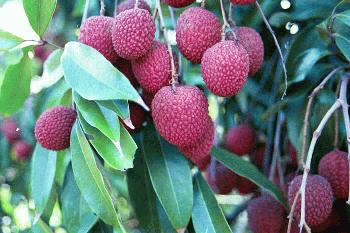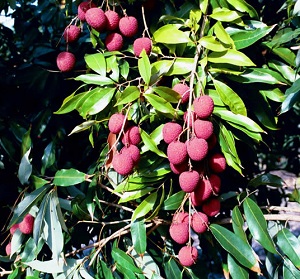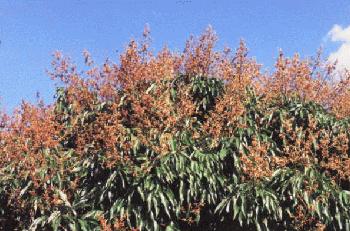From
Lychees Online
by Krystal Folino and Bill Mee
'Brewster'

Fig. 1
Also called Chen Zi, Chen Tze, or
Royal Chen Purple
The
second most common and popular commercial lychee variety or cultivar in
South Florida is the 'Brewster' which bears fruit somewhat reliably.
A
'Brewster' fruit is medium or large, sweet and juicy. At peak ripeness
the 'Brewster is truly delicious and in taste tests against other
varieties consistently outranks all of the others.

Fig. 2 
Perfect ripe 'Brewster' lychees
Lychees
flower and fruit on a panicle which is easily identified in this photo
(Fig. 2). The main cluster of lychees in the center is hanging from
multiple bloom spikes emerging from the main bloom spike which grows
from the end of the branch.
The only complaint people have with
the 'Brewster' is that is tends to have a medium to large seed, however
the fruit has commensurately more flesh, with an average of
approximately 74% flesh which is higher than many varieties with small
or "chicken-tongue" seeds.
As 'Brewster' fruit ripens the small
raised bumps on the fruit surface gradually smooth out and the skin of
the fruit turns from pinkish red to a bright purplish red. The inner
skin, or endocarp, is distinctly pinkish. The fruit is ellipse shaped
with flat shoulders and a round or slightly pointed tip. The 'Brewster'
variety is resistant to anthracnose so the fruit doesn't have as many
black spots on it that many other lychee varieties tend to have.
Typically,
'Brewster' lychees in the northern hemisphere are ripe during the month
of June and for last several years the season has ended during the 4th
of July weekend in our grove in Broward County, Florida. The season for
Brewsters is a little earlier for areas south of us and a little later
in area to the north of us. For example Mexico's 'Brewster' lychee
season begins in April, a little earlier than us, while eastern coastal
groves in Central Florida tend to still have 'Brewster' fruit into the
middle of July, a little later than us. The season for Brewsters in the
southern hemisphere like in Australia or Brazil is late January.

Fig. 3
'Brewster' tree in full bloom
The
'Brewster' trees are vigorous growers with a hemispherical shape and
upright, spreading habit of growth and wide crotch angles. The branches
strong and grooved or ribbed. The leaves are medium green, flat and the
edges are straight with an average of 6 leaves to a leaf stalk and new
growth flushes are slightly reddish to light green.
The
'Brewster' lychee is a "water type" so it grows best in areas where it
will get a lot of irrigation or natural rainfall. The 'Brewster'
variety originated in China where it bears reliably in Fujian/Fukien
along rivers and supposedly has a higher occurrence of shriveled or
"chicken tongue" seeds. Don't worry about overwatering a 'Brewster'
lychee because they can even survive in standing water for at least a
few days or up to about two weeks maximum.
Reverend Dr. William
N. Brewster, a well liked missionary in China, imported this variety to
South Florida between 1903 and 1906. He chose this variety because it
did well in the northern limits of the lychee growing area in China and
can withstand light frosts. The variety was originally called Chen Tze
or Royal Chen Purple after the Chen family, a famous and historic
lychee growing family in Guangdong province, and later renamed Brewster
in the United States.
The 'Brewster' is a great variety of
lychee and our reigning favorite. The trees are easy to care for and
the fruit is both beautiful and excellent tasting. We highly recommend
the 'Brewster' variety for commercial growing or edible landscape
enjoyment.
by Bill Mee and Krystal Folino - Lychees Online
Back to
Lychee Page
|
|



